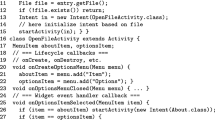Abstract
It is often necessary to construct GUI models for automated testing of event-driven GUI applications, so test cases can be generated by traversing the GUI models systematically. It is, however, difficult to apply traditional modeling techniques directly for mobile platforms as common static models cannot reflect application behaviors under different contexts. To address these challenges, we propose a novel approach for automated GUI modeling of mobile applications and introduce our unique definition of GUI state equivalence, which can reduce state space and facilitate model merging. The proposed modeling method can already discover subtle implementation issues. Real-world case studies show that the proposed approach is effective for adaptive GUI modeling on the Android platform.
This work is supported partly by the National Science Foundation under Grant No. 1016823 and 1040725. Any opinions, findings, and conclusions expressed in this work are those of the authors.
Access this chapter
Tax calculation will be finalised at checkout
Purchases are for personal use only
Similar content being viewed by others
References
Yang, W., Prasad, M.R., Xie, T.: A grey-box approach for automated GUI-model generation of mobile applications. In: Cortellessa, V., Varró, D. (eds.) FASE 2013 (ETAPS 2013). LNCS, vol. 7793, pp. 250–265. Springer, Heidelberg (2013)
Chen, G., Kotz, D.: A survey of context-aware mobile computing research. Dartmouth College, Technical report TR2000-381, November 2000. ftp://ftp.cs.dartmouth.edu/TR/TR2000-381.pdf
Graphical User Interface Testing Wiki Page. http://en.wikipedia.org/wiki/Graphical_user_interface_testing
Liu, Z., Gao, X., Long, X.: Adaptive random testing of mobile application. In: ICCET (2010)
Zhang, C., Ding, X., Chen, G., Huang, K., Ma, X., Yan, B.: Nihao: a predictive smartphone application launcher. In: Proceedings of MobiCase (2012)
Ramanathan, N., Alquaddoomi, F., Falaki, H., George, D., Hsieh, C., Jenkins, J., Ketcham, C., Longstaff, B., Ooms, J., Selsky, J., Tangmunarunkit, H., Estrin, D.: Ohmage: an open mobile system for activity and experience sampling. In: Proceedings of PervasiveHealth (2012)
Ohmage Homepage. http://ohmage.org/
Author information
Authors and Affiliations
Corresponding author
Editor information
Editors and Affiliations
Rights and permissions
Copyright information
© 2014 Institute for Computer Sciences, Social Informatics and Telecommunications Engineering
About this paper
Cite this paper
Xu, J., Ding, X., Chen, G., Drury, J., Wang, L., Li, X. (2014). A New Method for Automated GUI Modeling of Mobile Applications. In: Stojmenovic, I., Cheng, Z., Guo, S. (eds) Mobile and Ubiquitous Systems: Computing, Networking, and Services. MobiQuitous 2013. Lecture Notes of the Institute for Computer Sciences, Social Informatics and Telecommunications Engineering, vol 131. Springer, Cham. https://doi.org/10.1007/978-3-319-11569-6_54
Download citation
DOI: https://doi.org/10.1007/978-3-319-11569-6_54
Published:
Publisher Name: Springer, Cham
Print ISBN: 978-3-319-11568-9
Online ISBN: 978-3-319-11569-6
eBook Packages: Computer ScienceComputer Science (R0)




